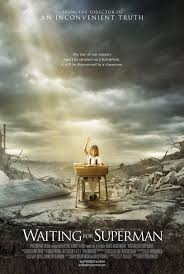Education is an essential American value, something that we have heralded as being of the utmost importance for hundreds of years. And that's not just an American sentiment; all over the world, the importance of education is stressed to children from an early age, and those who have access to it are considered among the luckiest. In America, however, our educational system has slipped behind most of the developed world. Waiting for "Superman," a documentary by Davis Guggenheim, takes a look at what's wrong with our education system and how we can fix it, so that our children will be able to excel in the new globalized world.




At least, that's what it ostensibly sets out to do.
From a technical standpoint, "Superman" is a very well-made film. Guggenheim is quite the visual artist, choosing interesting camera angles and focuses to frame his interviewees. He also knows how to choose just the right images and clips to serve his thesis, and the shots of some of the schools, several of which seem to be on the verge of collapse, are stunning. His incorporations of animations to detail facts and figures are inventive enough, giving you the facts with a wink and a smile despite the fact the opposite should be occurring. In all, Guggenheim is persuasive with his argument; no wonder so many have been moved by this film.
The film's biggest problem, though, is its argument. Guggenheim's thesis is simple: public schools are broken, its the teacher's unions' fault, therefore, enroll your kids in charter and private schools. Hopefully you can already see the problem there. He presents you the data on America's public schools, then compares them to those of the rest of the world, and tells you why we're falling behind. Charter schools produce significantly better results, but have limited space. But at least the charter schools don't have to deal with those pesky teacher's unions. The film is right in that bad teachers produce little educational progress, and that the system of tenure (in which teachers earn immunity from being fired) is messed up, but the unions are only a part of the problem. In fact, the film doesn't even mention that many of the states with the lowest high school graduation are right-to-work states, where the unions have no power. And education itself is very difficult to measure; the film never sets out the parameters of how one judges education. For example, we consider China to have a better education system based on how it teaches science and math and trains specialists; however, I learned from a classmate that many Chinese students learn very little about China itself, to the point where she, a native of China for 16 years, couldn't name any Chinese province apart from the one in which she lived.
The truth is that education is a very complex matter, one that doesn't have any easy fixes, despite what activists, detractors, presidents, teachers and parents might hope for. Guggenheim attempts to put a human face on the problem by following several children in their schools. However, all but one of these are disadvantaged kids, struggling with poverty or living in a single-parent household (or both). The one kid who doesn't have this situation is actually choosing charter school over a respectable public school, whereas the others are being sent to "dropout factories." But there is one thing that unifies all of them: they are all very much interested in learning. In fact, they're all bright kids that can't wait to go to school and learn more. As much as we and Guggenheim would want to believe otherwise, all children are not like this. Some kids just don't want to learn, or have a disability that prevents them from doing so. The ugly truth of it is that school isn't for everyone.
Waiting for "Superman" was obviously made with the best intentions, and it succeeds in sparking the conversation about this very important issue. The awareness it raises will, hopefully, result in good. But the film has a deeply flawed argument, oversimplifying an intricate problem that can't be narrowed down to a single cause. And instead of being a deep investigation into our education system and looking for places where reform can truly begin, the film serves as one long commercial for charter schools. Much like Guggenheim's Oscar-winning An Inconvenient Truth (which served as what seems to be the most expensive - and profitable - slide show ever), the film boils down a complex issue into a too-convenient package, but at least people are talking about it.
Comments